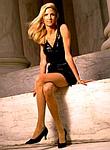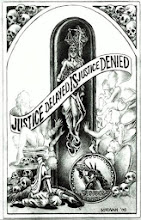
DeLay Hammers Earle of Austin
By Ann Coulter
Democrat prosecutor Ronnie Earle's conspiracy charge against Tom DeLay was thrown out this week, which came as a surprise to people who think it's normal for a prosecutor to have to empanel six grand juries in order to get an indictment on simple fund-raising violations. Mr. Earle will presumably assemble a seventh grand jury as soon as he locates someone in the county who hasn't served on a previous one.
It probably goes without saying that it is extraordinary for criminal charges to be thrown out by a judge before any jury ever hears the evidence. Juries decide guilt or innocence in this country. For the judge to dismiss an indictment before trial, it means he concluded that -- even if the jury finds everything Ronnie Earle alleges to be true -- no crime was committed.
Obviously, this was a huge victory for DeLay and, as The Washington Post put it, "a slap at Texas prosecutor Ronnie Earle." (More bad news for Ronnie Earle: Today President Bush said the embattled Texas D.A. was doing "a heck of a job.")
Or, in the words of CNN's Bill Schneider on what this means for Tom DeLay: "Not good." In the expert analysis of Schneider, it was "not good" for DeLay to have charges thrown out because it would have been even better if all the charges had been thrown out. It also would have been better if the judge had dismissed the conspiracy charges and given DeLay an ice cream cone.
But that doesn't mean having criminal charges against you dismissed is, I quote, "not good." And they think Fox News has twice CNN's ratings just because it's fair and balanced. The accountants at Fox could give a more penetrating legal analysis.
In the past few years, all TV news has become less biased due to the salubrious influence of Fox News. But Bill Schneider isn't backing off one inch! Watching Schneider is like entering a time machine and seeing how news was reported in the '80s. CNN ought to start broadcasting Schneider's appearances only in black and white.
According to Schneider, the judge's failure to dismiss the money laundering charges proves "obviously, on at least one charge the judge disagreed" with DeLay's claim that the prosecutor was politically motivated. Schneider's entire understanding of criminal law was apparently shaped during the Ally McBeal years.
Schneider would have said more, but he had to run off to file a story about how 4.3 percent growth, 215,000 new jobs, record productivity gains and continued growth in real estate prices were "not good" news for the economy.
In fact, all we know as a result of the judge's ruling on Monday is that the remaining charge against DeLay, if proved, would at least constitute a crime.
To repeat what you might already have heard in third grade: In America, the validity of criminal charges is determined by the trier of fact after a trial. A judge is not authorized to dismiss a criminal indictment handed up by a grand jury just because the prosecutor is a political hack.
This is true even if the prosecutor had to spend three years and empanel six grand juries to get an indictment.
It is true even if the same prosecutor also indicted Republican Kay Bailey Hutchison days after she was elected to the U.S. Senate, but after spending a year holding press conferences in which he called Hutchinson a criminal, still had no evidence and folded his hand.
It is true even if the prosecutor is participating in a documentary about a brave liberal prosecutor (Ronnie Earle) exposing a black-hearted Republican (Tom DeLay) -- which wouldn't make much of a movie if no charges were ever brought.
Thus, for example, Earle's baseless charges against Hutchison -- like the remaining charges against DeLay -- were not dismissed before trial. What happened was, the trial date came and Earle had no evidence. The judge ordered the jury to acquit.
Earle never admitted he had no evidence against Hutchison. Instead, he made a preposterous request of the judge. He asked the judge to issue a pre-emptive ruling declaring all documents that Earle planned to admit throughout the trial admissible -- without allowing the judge to know what those documents were or allowing the defense an opportunity to object. Obviously, the judge said he would have to see the documents first and decide admissibility on a case-by-case basis.
So now and forevermore, Earle claims his case against Hutchison was watertight, but because the judge ruled against him, he was prevented from presenting his "evidence" to the jury.
Remember that when liberals call Bill O'Reilly a "liar" because he won a Polk award, but one time he got confused and called it a Peabody award.


0 Comments:
Post a Comment
<< Home